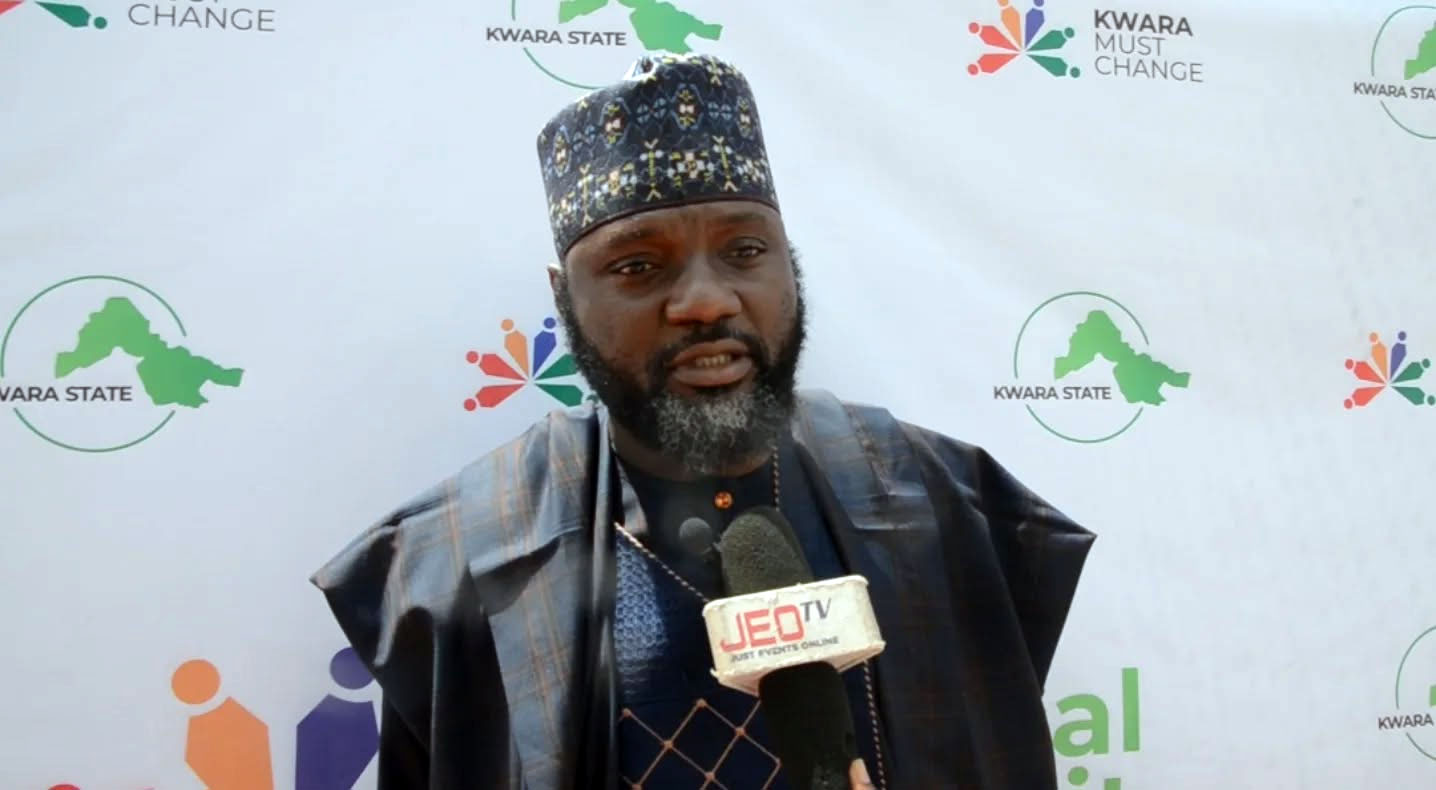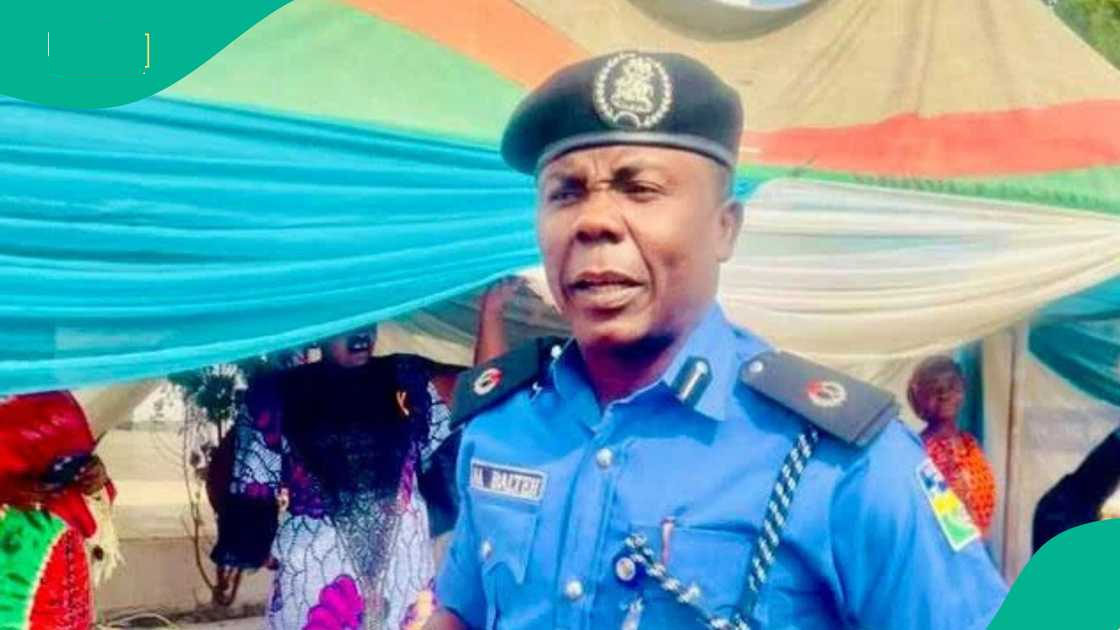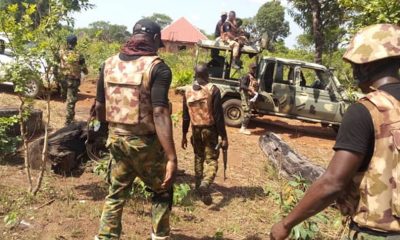metro
Nigerian military secretly aborts 10,000 pregnancies of women raped by terrorists

The Nigerian military has aborted over 10,000 pregnancies secretly of women and girls reportedly raped by Boko Haram terrorists in the North-East.
According to a report by Reuters, many of the women and girls had been kidnapped and raped by the terrorists.
Fati, who was kidnapped by terrorists and later rescued by the military, narrated her ordeal.
She lost contact with her family one night during an attack by insurgents on Monguno.
She was later captured by the terrorists, whipped and shunted into one of two pickup trucks with the other women, she said.
They drove through the night to the shores of the vast Lake Chad, where fighters loaded the women into canoes. As the sun rose, the captives were ferried out toward the lake’s myriad islands.
Fati said she was married off three times, forced to take a new husband whenever the previous one didn’t return from the war. The third, who impregnated her, “was the worst out of all of them,” she said. “He would hit me with the butt of his gun … He would beat me until I was sick.”

Fati was four months pregnant when liberated from the insurgents. Soon after, she says, soldiers medically aborted the pregnancy without telling her. And she was warned: “If you share this with anyone, you will be seriously beaten.” Photo Credit: REUTERS/Paul Carsten
When the Nigerian soldiers came that day about three years ago, she welcomed them.
Now in her 20s, Fati said shortly after being rescued with four months of pregnancy, uniformed men gave her and five other women mysterious injections and pills in a dim room at a military barracks in Maiduguri, the Borno state capital.
READ ALSO:
- EFCC to conclude auction of 435 forfeited vehicles in Lagos Thursday
- Court throws out suit challenging Tinubu’s candidacy
- Police launch manhunt for woman who burnt parents
After about four hours, Fati, who said she was about four months pregnant, felt a searing pain in her stomach and black blood seeped out of her. The other women were bleeding as well, and writhing on the floor. “The soldiers want to kill us,” she thought.
According to her, the soldiers aborted the pregnancies without telling them. And she was warned: “If you share this with anyone, you will be seriously beaten.”
The abortions mostly were carried out without the person’s consent – and often without their prior knowledge, according to the witness accounts. The women and girls ranged from a few weeks to eight months pregnant, and some were as young as 12 years old, interviews and records showed.
This investigation is based on interviews with 33 women and girls who say they underwent abortions while in the custody of the Nigerian Army. Just one said she freely gave consent. Reporters also interviewed five civilian healthcare workers and nine security personnel involved in the programme, including soldiers and other government employees such as armed guards engaged in escorting pregnant women to abortion sites. In addition, Reuters reviewed copies of military documents and civilian hospital records describing or tallying thousands of abortion procedures.
Three soldiers and a guard said they commonly assured women, who often were debilitated from captivity in the bush, that the pills and injections given to them were to restore their health and fight diseases such as malaria. In some instances, women who resisted were beaten, caned, held at gunpoint or drugged into compliance. Others were tied or pinned down, as abortion drugs were inserted inside them, said a guard and a health worker.
Bintu Ibrahim, now in her late 20s, recounted how soldiers gave her two injections without her consent after picking her up with a group of other women who fled the insurgents about three years ago. When the blood came, and the terrifying pain, she knew she and the others had undergone abortions. The women protested and demanded to know why, she said, until the soldiers threatened to kill them.
“If they had left me with the baby, I would have wanted it,” said Ibrahim, whose account was confirmed by a fellow former captive, Yagana Bukar.
At military facilities and in the field, some abortions proved fatal. Although Reuters could not determine the full scope of the deaths in nearly 10 years of the programme, four soldiers and two security officers said they witnessed women die from abortions, or saw their corpses afterward.
Ibrahim said she also witnessed a woman die after an injection at the time of her own abortion near a small village in the bush – an event corroborated by her companion Bukar.
READ ALSO:
- Auditor General report: 100 govt establishments risk zero allocation
- Senate cautions CBN over cash withdrawal limit
- Rita Ofili-Ajumogobia returns as high court judge four years after her dismissal
“That woman was more pregnant than the rest of us, almost six or seven months,” Ibrahim said. “She was crying, yelling, rolling around, and at long last she stopped rolling and shouting. She became so weak and traumatised, and then she stopped breathing.
“They just dug a hole, and they put sand over it and buried her.”
Reuters was unable to establish who created the abortion programme or determine who in the military or government ran it.
Nigerian military leaders denied the programme has ever existed and said Reuters reporting was part of a foreign effort to undermine the country’s fight against the insurgents.
“Not in Nigeria, not in Nigeria,” said Major General Christopher Musa, who heads the military’s counterinsurgency campaign in the northeast, in a November 24 interview with Reuters that addressed the abortion programme.
“Everybody respects life. We respect families. We respect women and children. We respect every living soul.”
General Lucky Irabor, Nigeria’s chief of defence staff, did not respond to requests for comment from Reuters. On December 2, a week after Reuters sought an interview with Irabor and shared detailed findings and questions with his office, the military’s director of defence information released a five-page statement to reporters, and later posted it on Facebook and Twitter. Major General Jimmy Akpor said Reuters was motivated by “wickedness” and a “bullying” mentality, according to the statement.
“The fictitious series of stories actually constitute a body of insults on the Nigerian peoples and culture,” Akpor added. “Nigerian military personnel have been raised, bred and further trained to protect lives, even at their own risk, especially when it concerns the lives of children, women and the elderly.”
Central to the abortion programme is a notion widely held within the military and among some civilians in the northeast: that the children of insurgents are predestined, by the blood in their veins, to one day take up arms against the Nigerian government and society. Four soldiers and one guard said they were told by superiors that the programme was needed to destroy insurgent fighters before they could be born.
“It’s just like sanitising the society,” said a civilian health worker, one of seven people who acknowledged performing abortions under army orders.
Four of the health workers interviewed by Reuters also said that the programme was for the good of the women and any children they might bear, who would face the stigma of being associated with an insurgent father.
The army-run abortion programme has been in place since at least 2013, and procedures were being performed through at least November of last year, according to accounts from soldiers.
The procedures have occurred in at least five military facilities and five civilian hospitals in the region, according to witness accounts and documentation reviewed by Reuters. Many occurred in Maiduguri, the largest city in Nigeria’s northeast and the command centre of the government’s war on Islamist extremists.
READ ALSO:
- NAF bombs bandit hideouts, kills scores in Kaduna
- JUST IN: Pastor Ayo Oritsejafor, wife finally part ways
- Hijab circular: MURIC expresses appreciation to Tinubu, Sanwo-Olu
The Maiduguri sites include the detention centre at Giwa Barracks, where Fati said she was forced to have an abortion. Other sites include the Maimalari Barracks, which is the city’s main military base, and two civilian hospitals – State Specialist and Umaru Shehu. The two hospitals did not comment on this story.
Forced abortions may amount to war crimes and crimes against humanity, according to four legal experts briefed by Reuters on its findings. Although forced abortions are not specifically criminalised under the Rome Statute of the International Criminal Court, the experts said, they could be construed as torture or other inhumane treatment and be prosecuted as such.
The International Criminal Court’s prosecutor found in 2020 that grounds existed to investigate possible war crimes and crimes against humanity by both Nigerian security forces and insurgents. But the court has not opened a probe.
The ICC’s Office of the Prosecutor declined to comment on Reuters’ findings.
SaharaReporters had reported how in April 2014, Boko Haram terrorists kidnapped 276 schoolgirls in Chibok town in Borno, prompting the #BringBackOurGirls campaign. About 98 of the kidnapped girls are still missing.
Two young women, Felerin and Aisha, described undergoing abortions after being taken into custody by the Nigerian military.
Other women interviewed by Reuters offered similar accounts of captivity and rescue – including being raped by insurgents and escaping with the help of soldiers who took them into custody and transported them under armed guard to military facilities or civilian hospitals. Many said they were made to give urine or blood samples before receiving unspecified injections and pills.
Nigerian facilities often used misoprostol, which helps induce labour or contractions, according to the documentation reviewed by Reuters. The drug is also used to treat ulcers and post-partum hemorrhaging, and is widely available in Nigerian cities, including through unofficial abortion-drug distribution networks. Women sometimes were also given the progesterone-blocker called mifepristone, which in many countries is used in conjunction with misoprostol in medication abortions.
Also given was the drug oxytocin, which is widely used during labour to stimulate contractions and safe to use when under medical supervision. Though experts say it is not recommended for abortions, it was sometimes given at military bases to trigger terminations, said two soldiers who performed the procedures.
Using oxytocin to induce abortion is dangerous, several international medical experts told Reuters, particularly if it is injected intramuscularly, as soldiers involved in the Nigerian programme said it was. If the drug is administered too quickly, the results can be fatal, the experts said.
The medications misoprostol and mifepristone are considered safe for abortions when the standard medical protocol is used, according to the World Health Organization and other authorities.
Among those forced to undergo an abortion was a girl named Hafsat.
She arrived at an army base in March 2019, a skinny teen of 14 or 15, clad in a turquoise dress and covered in mosquito bites, according to a soldier present that day.
The soldier said he and other troops injected Hafsat and three others with oxytocin while they lay on the ground outside the army clinic.
Within an hour, the soldier said, he heard cries and turned to see Hafsat bleeding heavily from between her legs. He grabbed her a cloth to stanch the blood.
Hafsat began crying out for a man named Ali, and for her mother. “Half an hour later, maybe, she just went quiet,” he said. “She died.”
The soldier said he and his comrades wrapped her in her turquoise dress and buried her. The memory haunts him.
“I can’t forget her name,” he said.
The details of the soldier’s account were corroborated by a second soldier at the base, who said he also witnessed the girl’s abortion and death.
In all, eight sources, including four soldiers, said they witnessed deaths or saw corpses of women who died from abortions performed at military barracks or administered in the field.
metro
Dr Sanusi Lafiagi Highlights Ramadan’s Spiritual Blessings, Post-Ramadan Challenges

Dr Sanusi Lafiagi Highlights Ramadan’s Spiritual Blessings, Post-Ramadan Challenges
Ilorin, Kwara State – Dr Sanusi Lafiagi, Islamic scholar and Chief Imam of Al-Hikmah University, Kwara State, has explained why the holy month of Ramadan is spiritually unique, emphasizing its role in personal transformation, moral discipline, and societal harmony.
In an exclusive interview with PUNCH, Dr Lafiagi described Ramadan as a “month of mercy, spiritual rejuvenation, and character formation,” citing the Prophet Muhammad (S.A.W.) who said: “Whenever Ramadan commences, all the gates of Paradise are opened, the gates of Hellfire are closed, and the devils are chained.”
According to Dr Lafiagi, these divine conditions make it easier for believers to perform righteous deeds, avoid sins, and draw closer to Allah’s mercy. Beyond fasting from food and drink, he highlighted that Ramadan fosters self-discipline, effective time management, self-restraint, charity, and Qur’an recitation, which help Muslims manage their lives spiritually and morally.
“During Ramadan, believers learn patience, forgiveness, and restraint,” he said, explaining that even when insulted, a fasting person is encouraged to respond calmly, reinforcing moral discipline. He added that acts of charity, especially Zakat al-Fitr, purify the soul while assisting the needy in the community.
READ ALSO:
- Assistant Commissioner of Police Dies in Fatal Road Accident
- Reasons Behind UniAbuja’s Expulsion of 28 Students, Withdrawal of 15 Certificates
- Yoruba Muslim Group Dismisses Viral Ramadan Date Claim, Reaffirms Sultan of Sokoto’s Authority
Dr Lafiagi also addressed why many Muslims struggle to maintain spiritual gains after Ramadan. He explained that after the month ends, the “gates of Jannah close, gates of Hellfire reopen, and the devils are freed,” making it easier for believers to lapse into previous sinful habits.
“Returning to old habits does not necessarily indicate weak faith,” he said, “but it shows that Ramadan’s lessons were not fully internalized in the heart and soul.” He stressed the importance of carrying Ramadan’s spiritual benefits into daily life to sustain moral consistency.
The scholar highlighted Ramadan’s societal impact, noting that consistent lectures and moral reminders during the month often reduce crime, improve social cohesion, and create a safer environment. He stressed that the company one keeps, the social environment, and exposure to media play significant roles in sustaining moral conduct post-Ramadan.
Dr Lafiagi also urged Muslims to utilize key moments during Ramadan, including the last 10 nights, particularly Laylatul Qadr (the Night of Power), where worship is rewarded more than in a thousand months. He emphasized the last third of every night for prayers and the giving of Zakat al-Fitr to purify the fast and help the needy.
Regarding exemptions, he clarified that sick, pregnant, nursing, and menstruating individuals may be exempt from fasting, but they should either make up missed fasts or feed the needy if unable to fast. “Allah does not burden a soul beyond its capacity,” he reminded.
Concluding, Dr Lafiagi stressed that a successful Ramadan is measured not only by the intensity of worship during the month but also by the consistency of righteous deeds and obedience to Allah afterward.
Dr Sanusi Lafiagi Highlights Ramadan’s Spiritual Blessings, Post-Ramadan Challenges
metro
Assistant Commissioner of Police Dies in Fatal Road Accident

Assistant Commissioner of Police Dies in Fatal Road Accident
The Assistant Commissioner of Police Abubakar Balteh, head of the State Criminal Investigation Department (SCID) at the Borno State Police Command, has died in a tragic road accident, the Command confirmed. His passing has sparked an outpouring of grief from colleagues and the wider Nigeria Police Force community.
According to a statement issued on Saturday by the Police Public Relations Officer, ASP Nahum Kenneth Daso, on behalf of the Commissioner of Police, ACP Balteh died while travelling in the north-east region. The circumstances surrounding the crash remain under investigation, and further details, including burial arrangements, were expected to be released by the police.
ACP Balteh, who led the SCID in Borno State, was described as a committed and hardworking officer who remained dedicated to his duties up until his death. The statement invoked the Islamic prayer “Innalillahi wa inna ilaihi raji’un” (“Indeed, we belong to Allah and indeed to Him we shall return”), highlighting the profound sense of loss felt within the Command.
READ ALSO:
- Reasons Behind UniAbuja’s Expulsion of 28 Students, Withdrawal of 15 Certificates
- Yoruba Muslim Group Dismisses Viral Ramadan Date Claim, Reaffirms Sultan of Sokoto’s Authority
- FCT Council polls: APC Wins Four Chairmanship Seats as PDP Takes Gwagwalada
The late officer’s death represents a significant loss to the Borno State Police, particularly the Criminal Investigation Department, where he played a pivotal role in overseeing investigations and maintaining law and order. His leadership and dedication had earned him respect from colleagues across the police community.
ACP Balteh was laid to rest on Sunday, February 22, 2026, in Potiskum, Yobe State, following Islamic rites. His passing comes just months after the death of another senior officer, Deputy Commissioner of Police Ahmed Ibn Umar, underscoring a challenging period for the Borno State Command.
Tributes have poured in from within the police force and beyond, with officials urging the public to remember the late officer’s family in their thoughts and prayers during this period of mourning. The Borno State Police Command reaffirmed its commitment to continuing the work of maintaining law, order, and safety in the state in honour of the late ACP’s service.
Assistant Commissioner of Police Dies in Fatal Road Accident
metro
SERAP Urges Tinubu to Repeal ‘Unlawful’ Mass Surveillance Regulations

SERAP Urges Tinubu to Repeal ‘Unlawful’ Mass Surveillance Regulations
The Socio-Economic Rights and Accountability Project (SERAP) has formally called on President Bola Tinubu to withdraw the Lawful Interception of Communications Regulations, 2019, describing them as unconstitutional, unlawful, and inconsistent with Nigeria’s international human rights obligations. The demand follows allegations that the phone of National Security Adviser (NSA) Nuhu Ribadu was intercepted, raising national concerns about phone tapping, mass surveillance, and privacy rights in Nigeria.
In a letter dated 21 February 2026 and signed by SERAP Deputy Director Kolawole Oluwadare, the civil rights organisation urged Tinubu to direct Bosun Tijani, Minister of Communications, Innovation and Digital Economy, to repeal the regulations immediately. SERAP also called for a transparent legislative process to develop lawful interception laws that comply with constitutional safeguards, judicial oversight, and international human rights standards.
READ ALSO:
- Trump Imposes 15% Global Tariff Hours After Supreme Court Blocks Previous Tariffs
- APC Wins Rivers Ahoada East State Constituency II Bye‑Election
- Opposition Weakens as Another Governor Eyes APC Move
The organisation criticised the regulations for granting broad and vague powers to intercept communications on grounds such as “national security,” “economic wellbeing,” or “public emergency” without sufficient judicial safeguards, transparency, or independent oversight. SERAP warned that these powers risk being weaponised against journalists, civil society, political opponents, and election observers, especially as Nigeria approaches the 2027 general elections.
According to SERAP, the current framework allows interception without a warrant in situations involving consent, threats to life, or the ordinary course of business. It also expands the category of “authorised agencies” arbitrarily and fails to provide adequate safeguards for the protection of private communications, encryption, and data storage. The organisation emphasised that such practices violate Section 37 of the Nigerian Constitution and international human rights obligations.
SERAP highlighted that secret surveillance and bulk data collection create significant risks of misuse, profiling, and political manipulation. The organisation noted that mass surveillance measures must comply with legality, necessity, proportionality, and prior judicial authorisation, with clear oversight mechanisms and remedies for affected individuals.
The civil society group warned that if the government fails to act within seven days of the letter’s publication, it would pursue legal action to compel compliance, reiterating that privacy and freedom of expression are essential for free and fair elections and democratic governance.
The call by SERAP adds to growing public debates about data privacy, lawful interception, and accountability in Nigeria. Observers argue that without reform, the regulations could undermine journalistic independence, political participation, and citizens’ trust in digital communication.
SERAP Urges Tinubu to Repeal ‘Unlawful’ Mass Surveillance Regulations
-

 Politics2 days ago
Politics2 days agoPeter Obi Launches ‘Village Boys Movement’ to Rival Tinubu’s City Boys Ahead of 2027
-

 Business9 hours ago
Business9 hours agoDangote Opens Refinery Investment to Nigerians With Public Share Sale Plans
-

 Education21 hours ago
Education21 hours agoUTME: JAMB Clarifies Position on Hijab During Biometric Capture
-

 News2 days ago
News2 days agoPolice to Arrest TikToker Mirabel After She Recants False Rape Claim
-

 International2 days ago
International2 days agoEpstein, Ex-Israeli PM Named in Alleged Profiteering From Boko Haram Crisis
-

 Education2 days ago
Education2 days agoOgun Gov Rewards Nigeria’s Best Primary School Teacher with Car, Bungalow
-

 Entertainment2 days ago
Entertainment2 days agoTacha Condemns False Rape Allegations After Mirabel Admits Fabrication
-

 News2 days ago
News2 days agoAmerican Woman, 64, Alleges Embassy Mocked 27-Year-Old Fiancé Before Visa Denial











